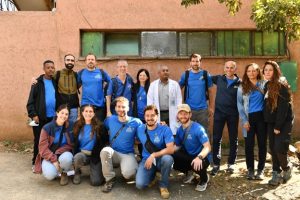
Recent studies indicate that, out of the 105 million people in Ethiopia, only 3 percent of them are beneficiaries of modern financial transactions. Due to poverty, lack of access to banks and insurances services as well as knowhow, the rest segment of the population is barred from such services. But traditional rotary and saving and transaction schemes such as the unregistered “ekub and arata” have still continued to date.
To fill such gaps and to outreach the poor, micro finance institutions are trying their level best through saving and credit system.
On the other hand, to provide insurance services to the most marginalized segments of the society such as small scale farmers and pastorals, the private insurance companies, in collaboration with donors, are engaged in provision of weather index and indemnities insurance services.
Micro insurance services are intended to work with the poor. Usually the scheme is supported by the government and donor organizations for poverty reduction and ensuring food security, said Solomon Zegeye, Nyala Insurance Company Manager General and head of Micro Insurance Business Department.
In the Ethiopian context, the private sector never dares to involve in micro insurance service to make business with the lower income groups because of the sector’s volatility and risky nature. In addition, huge money and high level knowledge are required.
Considering these shortcomings as mitigating factors, donors and international development partners encourage some private companies, such as Nyala Insurance Company to engage micro insurance business by providing technical and research supports.
Based on these objectives Nyala Insurance Company has provided weather index insurance service in Afar State to more than 3,500 pastorals, who lost their animals due to drought.
Also 1,257 cattle raisers as well had received compensation totaling Birr 682,800 due to shortage of rain. The insurance money is given to them through the project known as Building Resilience and Adaptation to Climate Extreme and Disaster (BRACED) It is supported by Farm Africa and Mercy Corps.
In Somali State, the insurance company had also provided similar insurance services to 9,000 pastorals whose animals are affected by drought. The information with regard to the drought and bad weather obtained through satellite images and their impact on animals is proved by agronomists’ site visits.
As to Solomon, his company has drawn lessons that such livestock insurance is important to the beneficiaries and intends to replicate the practice to other parts of the country. Side by side with these, the company studies the economic feasibility of the business and whether the stakeholders in the business have relevant skills to enhance the job or not.
In order to replicate the insurance business to other parts of the country, the company, along with the World Food Program, has kick started special projects in Tigray and Somali States.
In Ethiopia, there are about 17 insurance companies making business through selling premium to customers.
Among them, three companies show interest to engage in micro insurance business. But only Nyala and Oromia insurance companies are currently active.
Hence, the government should create enabling environment to attract more private companies to engage in micro insurance business and to that end relaxing rules and regulations is essential.
In fact, there is one draft law submitted to the council representatives. Still the consultation to ratify the law has continued. Rather it is better to endorse it as soon as possible because delay might slacken activities in the sector.
The other good news helpful to the sector is that the Ministry of Agriculture (and Natural Resources) in collaboration with various donors including GIZ has planned to engage in micro insurance businesses. If it is started, it could create a difference in alleviating poverty in rural parts of the country.
The scheme could bring together all micro insurance businesses that are currently working in a fragmented manner. But discussions, with all stakeholders, are called for to decide which entity plays the leadership role to manage the business effectively and efficiently.
As to Solomon, currently, his company in addition to the weather index insurance is providing indemnities insurance in concert with international none governmental organizations.
The project is in the Southern Nations, Nationalities Rand People State in Arbaminch town around Derashe areas. There, the Omo microfinance institution works as a local partner.
In this part of the country mainly the insurance business focuses on indemnities of livestock. Animals diseases, cows vulnerability to death while giving birth, death due to electric shock in connection with fallen wires and poles, abrupt sudden flooding which sweeps away heads of cattle and snake bites are the major risks which need insurance coverage.
The program is supported by BRACED and the government of Great Britain. In addition, Farm Africa works as partner in this program. Fifty percent of the insurance money is covered by donors and the rest 50 percent is covered by the cattle raisers .To that end they save some amount of money in their micro finance institutions.
The objective of the insurance coverage is to support farmers to fatten their cattle and raise productivity and augment their incomes too.
The Ethiopian Herald Sunday Edition 18 August 2019
BY ABEBE WOLDE GIORGIS





